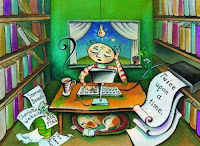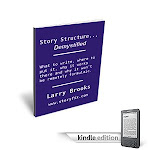Newton's First Law of Motion:
Every object in a state of uniform motion tends to stay in that state of motion unless an external force is applied to it.
Newton's Second Law of Motion
The relationship between an object's mass m, its acceleration a, and the applied force F is F = ma.
Newton's Third Law of Motion
For every action there is an equal and opposite reaction.
Okay - I know what you are thinking. I thought that this was a blog about writing, not physics. Why are you talking about Newton's three laws of motion? Well, if you stop and think about it, you will realize that Newton would have made a great fiction writer. He figured some of the basic requirements of great phy-ction writing (okay - bad joke, I know).
So how does physics apply to fiction writing? Let's take a look. First - an object in motion will stay in motion unless acted upon by an outside force. So let's assume that the object is your reader. In theory, you want your reader to start at the beginning of your book and keep reading through to the end. You don't want something to detract from their reading experience. So what might this external force be? Well, unfortunately, the reading universe is littered with them. Poor grammar and spelling seems to be one I am seeing more and more with the advent of self publishing. Another is back story - or rather, too much back story (yes, I have a hang up about back story because it has been a problem in my writing that I am trying to stop!). Lack of structure is another outside force as is poor character development. There are many more, too many to list, but it is imperative that you become aware of these potential landmines which may draw your reader out of the story and fail to allow them to come back in. Remember, an object in motion stays in motion....
Newton's second law is F=ma. So what does this have to do with writing? This represents the conflict in your story. If you don't have conflict, then you have no acceleration in the story. A story must have F (conflict) between the objects (characters), in order to have acceleration. Okay, that's F/m=a, but still, you get the idea. Conflict is what moves the story forward. It's what makes your reader want to keep reading through the next chapter rather than turning out the light. Each character has their own conflicts with which they need to deal. There are external conflicts which occur between the characters, but internal conflicts that the character must battle within themselves. Often, the external conflicts and external conflicts work against one another.
Finally, Newton's third law - for every action there is an equal and opposite reaction. This is an easy one. When you are developing a scene there are two basic types of scenes. Proactive and reactive. For every action (proactive scene) there is an equal and opposite reaction (reactive scene). When something happens, the character needs time to think about what happened and decide what his or her next move is going to be. Every scene though, should move the story forward (this brings us back to Newton's first law - once your story is in motion, it needs to stay in motion). For the most part, your scenes will be proactive/reactive alternating - constantly carrying your story forward and moving it towards its climax. Look at each of your scenes, determine if they are reactive or proactive. If they are neither, ask yourself, should this really be here. Sometimes the answer may be yes. It may actually be a proactive or reactive scene that just needs a little tweaking. Or it might have significant back story (not too much!) that is building up to something happening. But if your scene does not fit into the proactive or reactive mold, it needs to be looked at carefully.
So, moral of the story - if you remember Newton's laws of motion, you are moving in the right direction.
3 days ago






































